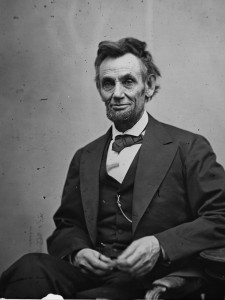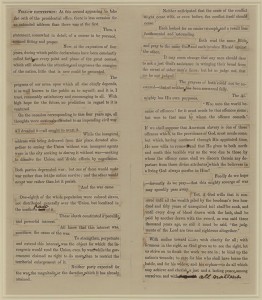This portrait of Pres. Abraham Lincoln, taken four weeks before his second inauguration as President of the United States, shows us how he looked at the time. It is among a handful of photographs taken by Alexander Gardner in his studio in Washington, DC, February 5, 1865. (For decades, the photographs had been dated erroneously to April 10th.) They are among the very few photos of Lincoln in which can be detected even a hint of a trace of a smile. His bow-tie is askew, betraying his lackadaisical attitude towards his attire; his left hand is slightly blurry: he was fidgeting with the spectacles he was holding in his lap.
Nearly three decades had passed since the United States had conducted a second presidential inauguration: Andrew Jackson had been the last previous president elected to the office twice, in 1836. Lincoln delivered his Second Inaugural Address on March 4, 1865, immediately before taking the oath of office for the second time, administered by the Chief Justice of the United States, Salmon P. Chase, holding an open Bible.
Here is the text of the speech as Lincoln read it from a one-page typescript:
Fellow Countrymen:
At this second appearing to take the oath of the presidential office, there is less occasion for an extended address than there was at the first. Then a statement, somewhat in detail, of a course to be pursued, seemed fitting and proper. Now, at the expiration of four years, during which public declarations have been constantly called forth on every point and phase of the great contest which still absorbs the attention, and engrosses the energies of the nation, little that is new could be presented. The progress of our arms, upon which all else chiefly depends, is as well known to the public as to myself; and it is, I trust, reasonably satisfactory and encouraging to all. With high hope for the future, no prediction in regard to it is ventured.
On the occasion corresponding to this four years ago, all thoughts were anxiously directed to an impending civil-war. All dreaded it — all sought to avert it. While the inaugural address was being delivered from this place, devoted altogether to saving the Union without war, insurgent agents were in the city seeking to destroy it without war — seeking to dissolve the Union, and divide effects, by negotiation. Both parties deprecated war; but one of them would make war rather than let the nation survive; and the other would accept war rather than let it perish. And the war came.
One eighth of the whole population were colored slaves, not distributed generally over the Union, but localized in the Southern part of it. These slaves constituted a peculiar and powerful interest. All knew that this interest was, somehow, the cause of the war. To strengthen, perpetuate, and extend this interest was the object for which the insurgents would rend the Union, even by war; while the government claimed no right to do more than to restrict the territorial enlargement of it. Neither party expected for the war, the magnitude, or the duration, which it has already attained. Neither anticipated that the cause of the conflict might cease with, or even before, the conflict itself should cease. Each looked for an easier triumph, and a result less fundamental and astounding. Both read the same Bible, and pray to the same God; and each invokes His aid against the other. It may seem strange that any men should dare to ask a just God’s assistance in wringing their bread from the sweat of other men’s faces; but let us judge not that we be not judged. The prayers of both could not be answered; that of neither has been answered fully. The Almighty has His own purposes. “Woe unto the world because of offences! for it must needs be that offences come; but woe to that man by whom the offence cometh!” If we shall suppose that American Slavery is one of those offences which, in the providence of God, must needs come, but which, having continued through His appointed time, He now wills to remove, and that He gives to both North and South, this terrible war, as the woe due to those by whom the offence came, shall we discern therein any departure from those divine attributes which the believers in a Living God always ascribe to Him? Fondly do we hope — fervently do we pray — that this mighty scourge of war may speedily pass away. Yet, if God wills that it continue, until all the wealth piled by the bond-man’s two hundred and fifty years of unrequited toil shall be sunk, and until every drop of blood drawn with the lash, shall be paid by another drawn with the sword, as was said three thousand years ago, so still it must be said “the judgments of the Lord, are true and righteous altogether.”
With malice toward none; with charity for all; with firmness in the right, as God gives us to see the right, let us strive on to finish the work we are in; to bind up the nation’s wounds; to care for him who shall have borne the battle, and for his widow, and his orphan — to do all which may achieve and cherish a just, and a lasting peace, among ourselves, and with all nations.
Pres. Lincoln quoted the Bible twice: Matthew 18:7 and Psalm 19:9. Chief Justice Chase pointed out later that, for his oath, Lincoln had opened the Bible to the fifth chapter of Isaiah in which verses 27-28 were marked with pencil. It’s easy to see why that entire passage, and those two verses especially, were on Lincoln’s mind as he was concluding his first term in office, the country was entering the fifth Spring of the war, and Lincoln finally felt sure its end was near.
After the inauguration ceremony, a gathering was held at the White House, during which Lincoln is said to have shaken hands with 6,000 well-wishers. One of them, well-known former slave and abolitionist Frederick Douglass, told him, “Mr. Lincoln, that was a sacred effort.”
Only six weeks later, Abraham Lincoln would lie on his deathbed in a borrowed room in William Petersen’s boarding house.
For a more in-depth treatment of the speech, see the lengthy discussion, including comments, here: Why Abraham Lincoln’s 2nd Inaugural Address is poetry….





